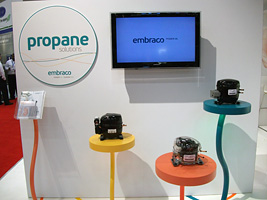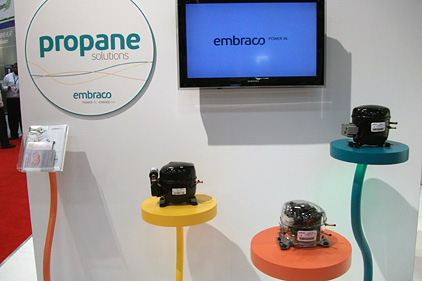
|
| The increasing number of HC-refrigerant related technologies — such as shown here at the AHR Expo in 2013 — is a demonstration of the need for ongoing technician education when it comes to dealing with the refrigerant. |
Even so, the U.S. Environmental Protection Agency (EPA) document 40 CFR Part 82, titled “Protection of Stratospheric Ozone: Listing of Substitutes for Ozone-Depleting Substances — Hydrocarbon Refrigerants,” officially gave Significant New Alternatives Policy (SNAP) approval to R-290 (propane), R-600a (isobutene), and R-441A (a blend marketed by ComStar International as HCR 188c).
The approval initially comes with some limitations. These include charge sizes to 57 grams for household appliances, and 150 grams for commercial units and only for equipment specially designed for the approved HCs with ignition sources minimized and with no retrofitting allowed. EPA also requires warnings and labels to make those working on the equipment aware that the system contains a potentially flammable gas in the refrigeration system.
Advocates of the use of the refrigerants expect the range of allowable applications in the United States to continue to grow. With that comes increased training and some developments that indicate the importance of proper training.
Training
In regard to training, RSES announced at its last international conference the release of hydrocarbon refrigerants training material and a certificate for successful completion of the training.
The “Hydrocarbon Refrigerants” study guide is designed to assist service technicians in understanding the requirements to safely maintain and service systems that utilize flammable refrigerants, including R-290, R-600a, and R-441A.
The study guide includes the following topics:
• Introduction to hydrocarbon refrigerants;
• Regulations and standards;
• Refrigerant safety;
• Compressor-terminal venting;
• Compressor changeout;
• System flushing,
• Purging and pressure testing for leaks;
• Compressor misuse;
• Compatibility;
• Service procedures;
• Temperature-pressure chart for HC refrigerants; and
• A SNAP appendix detailing substitutes subject to use restrictions.
In addition to the study guide, the program is available through RSES eLearning as a training course and test, or a test-only option. The online training course includes a “Hydrocarbon Refrigerants” study guide PDF, an online review, and test. Individuals interested in the online training course or test may make purchases online. However, RSES said interested groups or companies are encouraged to contact RSES directly by calling 800-297-5660, ext. 2337, or emailing orders@rses.org.
“In response to the EPA approval of hydrocarbon refrigerants, RSES has developed this safety training program with a test to prove the technicians knowledge of handling these refrigerants. At the successful completion of the program and test, the candidate can download a certificate of completion," said Pat Murphy, RSES director, training and testing.
Publication date: 2/25/2013



Report Abusive Comment